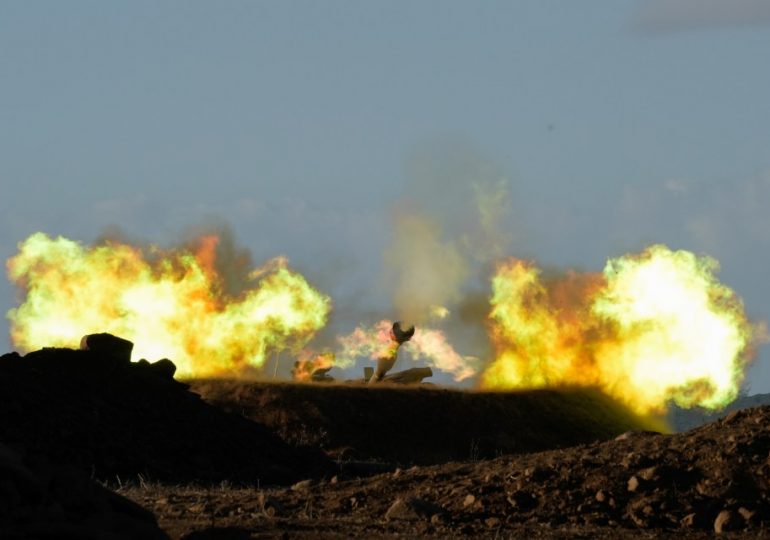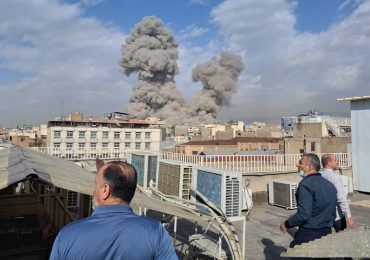ISRAEL is planning to strike Iran’s oil fields in response to Tehran’s ballistic missile attack amid boiling tensions between the two archenemies.
Israeli PM Netanyahu vowed to retaliate against Iran after it unleashed a barrage of 180 missiles in a major escalation triggering fears of a Middle East all-out war.
APAn Israeli mobile artillery unit fires a shell from northern Israel towards Lebanon[/caption]
APFlames rise from an apartment which caught fire after an Israeli airstrike in Beirut[/caption]
Workers remove broken glass from a damaged building that was hit during Iran’s missile attack in Tel Aviv
A barrage of rockets were fired from Iran on Tuesday
ReutersSmoke billows over Beirut, after overnight Israeli air strikes[/caption]
Netanyahu’s response to Iran’s blitz could target oil production facilities inside Iran, Israeli officials told Axios.
Other possible targets would be the country’s air defence system as well as assassinations of senior figures.
Netanyahu said Iran “made a big mistake and it will pay for it.”
“The regime in Iran does not understand our determination to defend ourselves and our determination to retaliate against our enemies,” he added.
Washington said it would work with Israel to ensure Iran faced “severe consequences” for Tuesday’s attack.
Israel Defence Forces’ Daniel Hagari said: “We are on heightened alert on defence and offensive.
“We will protect the citizens of Israel. This missile fire will have consequences.
“We have plans, and we will act in the time and place that we choose.”
It comes as…
At least six people shot dead in ‘terror attack’ in Israeli city Tel Aviv
Elite IDF paratroopers & commando units launch ground invasion of Lebanon
Israel vows to ‘crush Hezbollah’ after launching ‘Northern Arrows’ invasion
‘Fierce’ clashes erupt between IDF troops and Hezbollah terrorists
Israel declares no-go zone for Lebanese civilians south of the Litani River
UK Government charters emergency flight out of Lebanon for fleeing Brits
Hezbollah was on cusp of launching chilling Oct 7-style attack before special forces struck
In response, Tehran threatened Israel would suffer the “vast destruction” of its infrastructure if it attacks Iran.
Iran’s military also warned of “strong attacks” on military bases in the region if Israel’s allies intervene.
Israelis scrambled for bomb shelters as air raid sirens sounded and the orange glow of missiles streaked across the night sky.
It comes as Iran launched a missile blitz after Israel’s ground invasion Operation “Northern Arrows” in Lebanon.
Israeli military spokesman Rear Adm. Daniel Hagari said the country’s air defenses intercepted many of the incoming Iranian missiles, though some landed in central and southern Israel.
The Israeli military said today that regular infantry and armoured units were joining ground operations in southern Lebanon but said they would remain limited and localised in scope.
Hezbollah’s decade of destructive preparation
By Foreign News Reporter Juliana Cruz Lima
Following the 2006 Lebanon War, in which Israel and Hezbollah fought to a bloody standstill, the terror group began preparing for the next conflict.
They constructed a vast underground network across southern Lebanon.
The lessons of that war, in which Hezbollah’s small, mobile units were able to surprise and sometimes overpower Israeli forces, have been embedded in its military doctrine ever since.
The tunnels are now a key part of this strategy, allowing Hezbollah to replicate the tactics of insurgencies around the world: strike fast, disappear, and use the enemy’s size and strength against them.
Some of these tunnels have been found stretching into Israeli territory, designed to facilitate surprise raids deep inside northern Israel.
In 2018, the IDF launched Operation Northern Shield, a months-long mission to detect and destroy Hezbollah’s cross-border tunnels.
The discovery of these tunnels — some reinforced with concrete and running dozens of meters underground — revealed just how advanced Hezbollah’s capabilities had become.
Last month, Hezbollah revealed its hidden terror tunnel network from which missiles can be launched in a chilling threat to Israel.
A blood-curdling video released by the Lebanese terrorists revealed a giant underground roads with enough room for lorries to transport their deadly weapons.
Posters of leaders and soldiers adorn the tall stone walls as heavily armed men speed through the “missile city” in motorbikes.
Trucks loaded with enormous missiles make their way through the dark roads in a frightening glimpse of the terrorists’ arsenal.
Drone footage then shows the seemingly endless terror maze, which also appears to be home to military tech and computers.
Inside the terror tunnels, Hezbollah fighters can move unseen, store weapons, and launch ambushes, creating a dangerous cat-and-mouse game with the IDF.
They can also move into a much larger network of bunkers, missile silos, and command centres, deeply embedded in civilian areas.
These tunnels – which can stretch for miles – link critical positions, allowing Hezbollah fighters to emerge, strike, and then vanish back underground before Israel can respond.
Reports also suggest that Hezbollah has been expanding its tunnel network in southern Lebanon in recent weeks.









